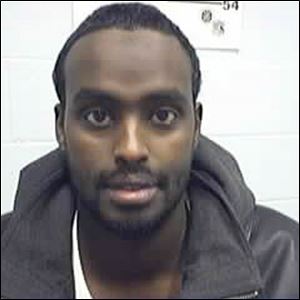
Ally of al-Qaida terrorist admits to conspiracy in mall plot
8/1/2007
Abdi
COLUMBUS, Ohio The guilty plea of another Ohio man to terrorism charges, the second such conviction in four years, is turning attention to the last of three men investigators say are linked by e-mails, phone calls and a coffee shop gathering.
Nuradin Abdi pleaded guilty Tuesday to one count of conspiring to provide material support to terrorists, a conspiracy the government says included a plot to blow up an Ohio shopping mall.
Abdi, 35, entered his plea before U.S. District Judge Algenon Marbley a week before the expected start of his trial.
Under a plea deal, Abdi is expected to receive a 10-year sentence on the count, which carries a maximum penalty of 15 years. Three charges were dropped in exchange for the plea. He ll be deported after serving his sentence.
The Justice Department accused Abdi of suggesting the plan to attack an unidentified Columbus shopping mall during an August 2002 coffee shop meeting with now-convicted al-Qaida terrorist Iyman Faris and a third suspect, Christopher Paul. The alleged plot was never carried out.
Faris is serving 20 years in a maximum-security federal prison in Florence, Colo., after pleading guilty for his role in an al-Qaida plot to destroy the Brooklyn Bridge. Faris scouted the bridge and told al-Qaida its plans wouldn t work, court papers have said.
Paul, who grew up in suburban Columbus, was charged in April with plotting to bomb European tourist resorts and U.S. government facilities and military bases overseas.
Abdi testified under oath that he talked with Faris and Paul at the coffee shop where he suggested they plan to detonate a bomb in a shopping mall to avenge U.S. policy and military action in Afghanistan, according to a statement of facts submitted by the government during Tuesday s hearing.
The statement of facts, agreed to by the government and Abdi as part of the plea deal, outlined a series of events that began when Abdi entered the United States from Somalia in 1995, continued with trips to Kenya and Somalia in 2000 seeking camps where he could train for holy war and concluded with the coffee shop conversation.
Prosecutors have attempted to show close connections between the three men. They say Abdi sent e-mails in 2001 and 2002 to Faris and say some of Faris phone bills were found in Abdi s residence.
They say Abdi also called phone numbers for Paul and took a trip with him to Pittsburgh in September 2002. He also listed Paul, 43, as a personal reference on a 2001 job application.
They also say Abdi gave Paul stolen credit card numbers after telling Abdi he needed the numbers to buy laptops for use by holy warriors in Afghanistan.
Abdi s attorneys said he was merely upset at the war in Afghanistan and reports of civilians killed in bombings by the U.S.-led invasion. They have said the stolen credit card numbers were never used.
Abdi had called Faris as a possible witness on his behalf. Abdi will never testify against Paul, his attorney, Mahir Sherif, said Tuesday.
It violates Islamic principles to testify against other Muslims, Sherif said. He said, I am a Muslim. I m not going to go in front of the government and testify against any other Muslims.
James Gilbert, Paul s Columbus attorney, said Tuesday he was not familiar with the facts of Abdi s case and couldn t comment on the effect of the plea deal on the charges against Paul.
Sherif said Abdi agreed to the plea to get on with his life and because he worried what a jury would say given the country s current mood and attitudes toward Islam and Muslims. Abdi entered the plea against Sherif s advice, he added.
Abdi previously turned down a plea deal that would have meant only five years in prison, Sherif said.
Abdi, wearing jailhouse blue pants and a light brown shirt, stood before Marbley shackled at the feet and hands. He smiled as he struggled to raise his right hand to take the oath before answering Marbley s questions.
The government called the agreement a victory against terrorists.
Today s case should serve notice to those who would take advantage of our country s freedoms to support and conspire with international terrorists who are our sworn enemies, said Kenneth Wainstein, assistant U.S. attorney general for national security.
Federal agents arrested Abdi the morning of Nov. 28, 2003, the day after Thanksgiving, out of fear the attack would be carried out on the heavy shopping day. He was arrested at 6 a.m. while leaving his Columbus home for morning prayers.
Abdi was to remain at the Franklin County jail until his sentencing date, which was not set.